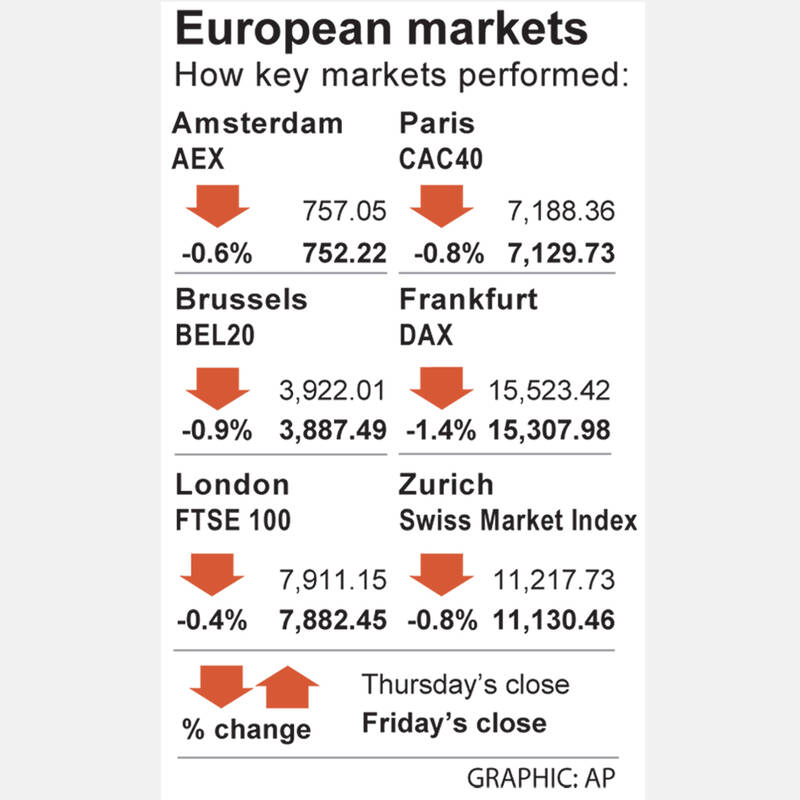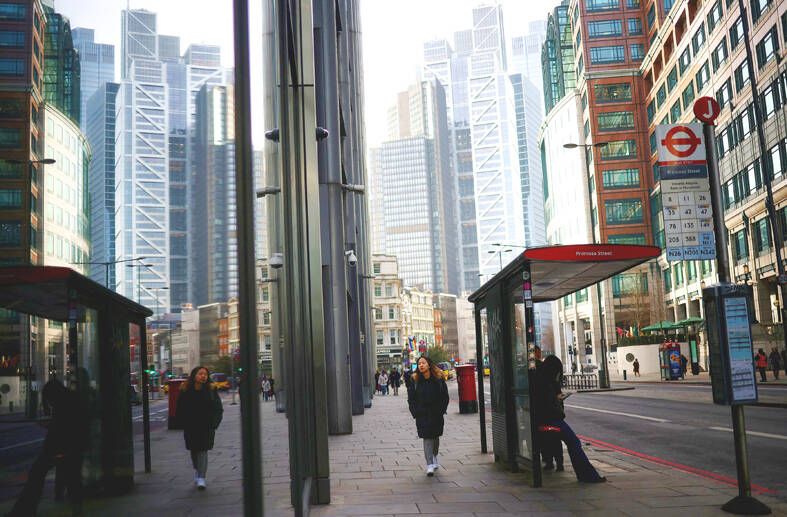European shares dropped on Friday, pressured by a jump in yields as investors grappled with the prospect of a prolonged period of interest rate hikes by top central banks, while London’s FTSE 100 Index also closed lower.
The pan-European STOXX 600 closed down 0.96 percent at 457.89, and fell 0.62 percent for the week, its first weekly decline in three weeks.
The blue-chip FTSE 100 shed 0.36 percent to 7,882.45, backing off from record highs reached on Thursday, and posted a weekly fall of 0.24 percent.

European shares have gained nearly 8 percent so far this year, following a 13 percent slump last year, thanks to recent signs of economic resilience, backed by robust earnings and hopes of a moderation in policy tightening.
However, a chorus of US Federal Reserve and European Central Bank (ECB) policymakers in the past few days have pushed back against market expectations that the rate hiking cycle was close to an end, with ECB executive board member Isabel Schnabel being the latest to talk about the need for more tightening. Officials from the Bank of England appeared split about the need for further rate hikes.
All eyes are on US consumer price index (CPI) data for last month, which are expected this week and would be crucial in shaping market expectations of future interest rate hikes.

Photo: Reuters
“Markets are fearing higher interest rates and [it’s] going to be a push and pull until the US CPI data on Tuesday,” HYCM chief market analyst Giles Coghlan said.
Coghlan also said that a US consumer sentiment survey showing an increase in one-year inflation expectations for this month has exacerbated jitters around interest rate hikes.
Britain’s economy showed zero growth in the final three months of last year, data showed, meaning it narrowly avoided entering a recession, in line with what most economists were anticipating.
“The UK has escaped recession by the skin of its teeth,” Raymond James Investment Services Ltd European strategist Jeremy Batstone-Carr said.
“However, whether we are officially in recession will not make much difference to most people — it will simply feel like a continuation of the present sluggishness and cost-of-living woes,” he said.
The domestic-oriented FTSE 250 Index closed 1.22 percent lower at 20,030.07. It was down 2.74 percent for the week, its steepest weekly loss in more than four months.
German government bond yields rose on Friday, heading for the largest weekly rise of the year.
Travel and leisure stocks, and retailers, were the worst performers among STOXX 600 sector indices, down 3.9 percent and 3.5 percent respectively.
Adidas AG fell 10.9 percent, logging its steepest drop in nearly three years after the sportswear maker warned it could plunge to a loss this year for the first time in three decades. The company’s peer Puma SE also fell 4.6 percent.
Swedish defense equipment maker Saab AB soared 11.8 percent to top the STOXX 600 after reporting a rise in fourth-quarter operating profit.
More than half of the 93 STOXX 600 companies that have reported earnings so far have beaten market expectations, Refinitiv data showed.

UNCERTAINTY: Innolux activated a stringent supply chain management mechanism, as it did during the COVID-19 pandemic, to ensure optimal inventory levels for customers Flat-panel display makers AUO Corp (友達) and Innolux Corp (群創) yesterday said that about 12 to 20 percent of their display business is at risk of potential US tariffs and that they would relocate production or shipment destinations to mitigate the levies’ effects. US tariffs would have a direct impact of US$200 million on AUO’s revenue, company chairman Paul Peng (彭雙浪) told reporters on the sidelines of the Touch Taiwan trade show in Taipei yesterday. That would make up about 12 percent of the company’s overall revenue. To cope with the tariff uncertainty, AUO plans to allocate its production to manufacturing facilities in

Taiwan will prioritize the development of silicon photonics by taking advantage of its strength in the semiconductor industry to build another shield to protect the local economy, National Development Council (NDC) Minister Paul Liu (劉鏡清) said yesterday. Speaking at a meeting of the legislature’s Economics Committee, Liu said Taiwan already has the artificial intelligence (AI) industry as a shield, after the semiconductor industry, to safeguard the country, and is looking at new unique fields to build more economic shields. While Taiwan will further strengthen its existing shields, over the longer term, the country is determined to focus on such potential segments as

Chizuko Kimura has become the first female sushi chef in the world to win a Michelin star, fulfilling a promise she made to her dying husband to continue his legacy. The 54-year-old Japanese chef regained the Michelin star her late husband, Shunei Kimura, won three years ago for their Sushi Shunei restaurant in Paris. For Shunei Kimura, the star was a dream come true. However, the joy was short-lived. He died from cancer just three months later in June 2022. He was 65. The following year, the restaurant in the heart of Montmartre lost its star rating. Chizuko Kimura insisted that the new star is still down

While China’s leaders use their economic and political might to fight US President Donald Trump’s trade war “to the end,” its army of social media soldiers are embarking on a more humorous campaign online. Trump’s tariff blitz has seen Washington and Beijing impose eye-watering duties on imports from the other, fanning a standoff between the economic superpowers that has sparked global recession fears and sent markets into a tailspin. Trump says his policy is a response to years of being “ripped off” by other countries and aims to bring manufacturing to the US, forcing companies to employ US workers. However, China’s online warriors